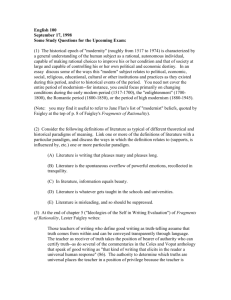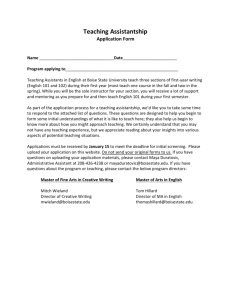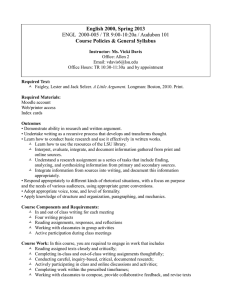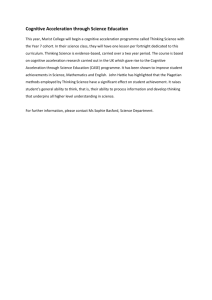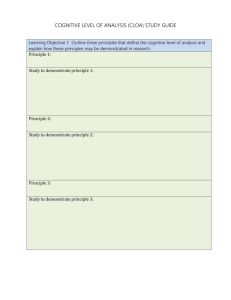theoretical notion
advertisement
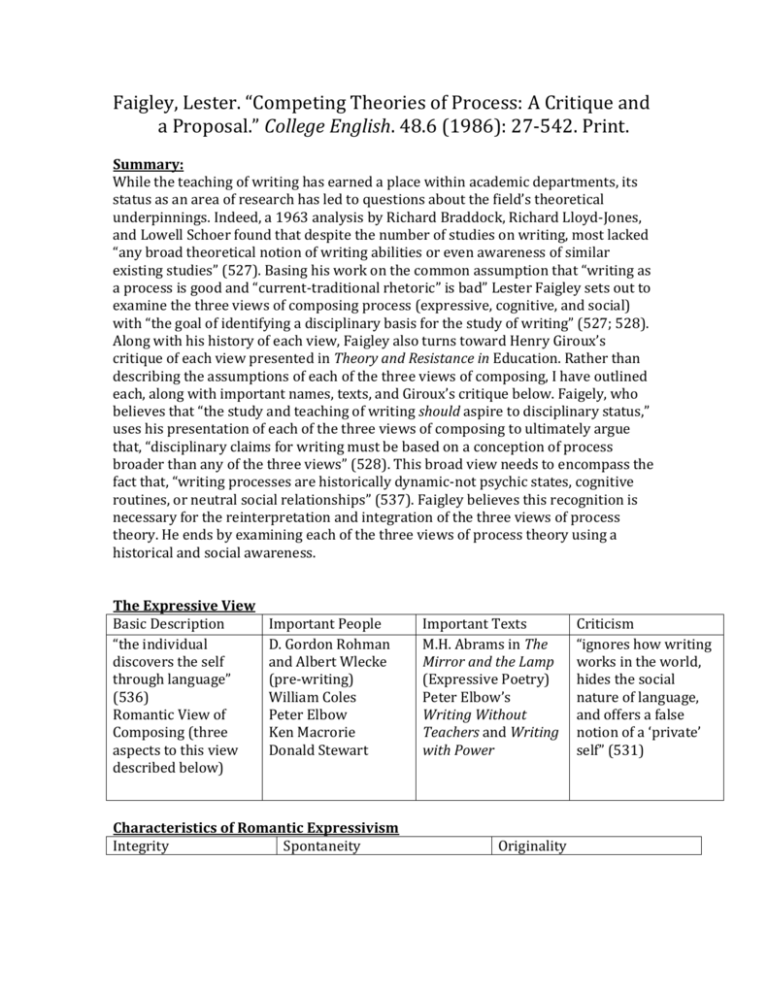
Faigley, Lester. “Competing Theories of Process: A Critique and a Proposal.” College English. 48.6 (1986): 27-542. Print. Summary: While the teaching of writing has earned a place within academic departments, its status as an area of research has led to questions about the field’s theoretical underpinnings. Indeed, a 1963 analysis by Richard Braddock, Richard Lloyd-Jones, and Lowell Schoer found that despite the number of studies on writing, most lacked “any broad theoretical notion of writing abilities or even awareness of similar existing studies” (527). Basing his work on the common assumption that “writing as a process is good and “current-traditional rhetoric” is bad” Lester Faigley sets out to examine the three views of composing process (expressive, cognitive, and social) with “the goal of identifying a disciplinary basis for the study of writing” (527; 528). Along with his history of each view, Faigley also turns toward Henry Giroux’s critique of each view presented in Theory and Resistance in Education. Rather than describing the assumptions of each of the three views of composing, I have outlined each, along with important names, texts, and Giroux’s critique below. Faigely, who believes that “the study and teaching of writing should aspire to disciplinary status,” uses his presentation of each of the three views of composing to ultimately argue that, “disciplinary claims for writing must be based on a conception of process broader than any of the three views” (528). This broad view needs to encompass the fact that, “writing processes are historically dynamic-not psychic states, cognitive routines, or neutral social relationships” (537). Faigley believes this recognition is necessary for the reinterpretation and integration of the three views of process theory. He ends by examining each of the three views of process theory using a historical and social awareness. The Expressive View Basic Description “the individual discovers the self through language” (536) Romantic View of Composing (three aspects to this view described below) Important People D. Gordon Rohman and Albert Wlecke (pre-writing) William Coles Peter Elbow Ken Macrorie Donald Stewart Characteristics of Romantic Expressivism Integrity Spontaneity Important Texts M.H. Abrams in The Mirror and the Lamp (Expressive Poetry) Peter Elbow’s Writing Without Teachers and Writing with Power Originality Criticism “ignores how writing works in the world, hides the social nature of language, and offers a false notion of a ‘private’ self” (531) Is the text sincere Ex. Donald Stewart’s 1969 student paper about money Impossible to assess the sincerity of a text. Writers and readers are bound by culture. Writing and thinking aren’t separate processes Peter Elbow’s Writing without Teachers Free-writing Organic Growth “”good” writing does not follow rules but reflects the process of the creative imagination” Revision=shapes unformed material Cognitive View Basic Description “an individual constructs reality through language” (536) Janet Emig was the first to respond to the call for research on cognitive process at the 1966 Dartmouth Seminar on English Her work was influention in that it provided a new methodology and agenda for research Two Cognitive Theories of Composing (explained Below) Important People D. Gordon Rohman and Albert Wlecke (heuristics and pre-writing, Writing, and Re-Writing model) Linda Flower, Barry Kroll, and Andrea Lunsford Janet Emig Difficult to adapt to current theories because it is tied to the notion of natural genius Contemporary view of originality replaces natural genius with “an emphasis on the innate potential of the unconscious mind” (531) Creative writing can stimulate originality and selfactualization Criticism Problem in trying to find a universal law underlying writing since nothing is universal, but rather social in nature. In fact, the theory seems to neglect culture entirely. Further, the model neglects “the content of writing” and downplays “conflicts inherent in acts of writing” (534). Because of this, the cognitive view overlooks “differences in language use among students of different social classes, genders, and ethnic backgrounds” (534) Cognitive-Developmental Psychology -James Britton and colleagues -Examination of the developing sense of audience in young writers -Children have a difficult time as writers because a reactive presence (which is present when they speak) is not present when they write -To help develop a sense of audience children need to imagine real writing situations -Barry Kroll -Studied developmental stages in writing -Applied Jean Piaget’s concept of egocentrism to writing - Children develop the ability to imagine another perspective (decenter) more slowly in writing than speaking -Andrea Lunsford -Applied Kroll’s egocentricism to college basic writers Flower and Hayes Model -Assumptions underlying their work are based in cognitive research -Allen Newell and Herbert A. Simon’s Human Problem Solving “the key to understanding how people solve problems is in their “programmability”” (533) -Can model thinking and language using computers -Added to feedback loop theory by explaining that plans come from the task environment which is “defined in terms of a goal coupled with a specific environment” (533) -Norbert Wiener’s theory of Cybernetics -Beginnings of cognitive science -“the feedback loop in which the regulating mechanism receives information from the thing regulated and makes adjustments” (533) -George A. Miller, Eugene Galanter, and Karl Pribram -Plans and the Structure of Behavior -Brain divided into a memory and processing unit -Human behavior is “guided by plans that are constantly being evaluated as they are being carried out in a feedback loop” (533) -Flower and Hayes model helped promote a ‘science consciousness’ among writing teachers” (534) -Flower and Hayes model was appealing because it “suited a popular conception that language comes after ideas are formed” (534) The Social View -Comes from diverse disciplinary traditions and is less solidified than the other two views. -Assumption: “human language (including writing) can be understood only from the perspective of a society rather than an individual” (535) -Not simply looking at the context surrounding discourse-looking at “how the individual is a constituent of a culture” (535) -Rejects the theory that writing lies within the individual -Four lines of research characterized by one of four traditions from which they emerged: Poststructuralist Theories of Language “Reading is neither an experience of extracting a fixed meaning from a text nor is it a matter of making words mean anything you want them to” (535) -Discourse Communities -No universal definition of an expert writer -“any effort to write about the self or reality always comes in relation to previous texts” (536) Sociology of Science Ethnography Marxist Studies of Literacy Look at the composition of scientific texts -“challenges the assumption that scientific texts are ‘active social tools in the complex interactions of a research community’” (536) - Used to “examine the immediate communities in which writers learn to write-the family and the classroom” (536) -Disparity between the way literacy is used in the world and at home and literary expectations at school -Also used to look at writing in the workplace -Finds fault with the other social positions because they don’t deal with concepts such as power, class, and ideology. -“any act of writing or of teaching writing must be understood within a structure of power related to modes of production” (537) Questions: 1) Faigley opens with the statement: “voices from outside and from within the ranks question whether a discipline devoted to the study of writing exists or if those who teach writing simply assume it exists because they share common problems and interests” (527). Using the writing we have covered thus far (including the Nystrand et al. piece) what do you think about this statement? 2) Take a look at the final part of the article titled “Toward a Synthesis.” Faigley lists a several issues and the way history can be applied to better understand them. Were there any issues that stood out to you that you would like to discuss? If not, look at the paragraph about the expressive view in which Faigley ends by questioning how “the possibilities for individual expression will be affected by major technological changes” (538). He calls this “one of the most important areas of research for those who study writing” (538). Using this broad statement can you generate any research projects or even hypotheses? 3) With each of the three views of process in mind, do you agree with Faigley’s argument that one needs to take a broader view than any of the individual views allows, or do you think it would be better to select a single view and augment it to create a structure on which a disciplinary basis can stand? One research or pedagogical application you see for the reading: I believe a research application can be found in Faigley’s final “Toward a Synthesis” section in which he outlines the direction in which research needs to take. In this section he outlines several research problems which include an examination of the concept of “community,” how individual expression is/will be affected by technological changes, and examining the origins of an individual writer’s goals.
